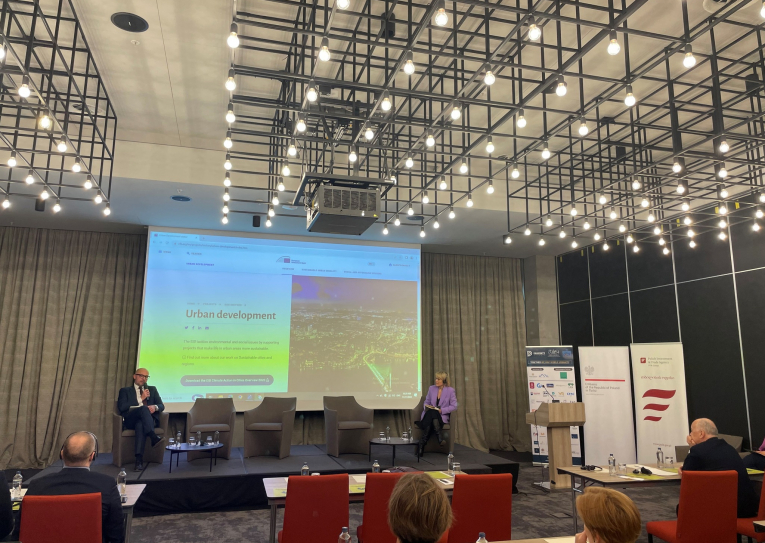Our first guest is the chief analyst from Galt & Taggart, Kakhaber Samkurashvili, who will review the year 2020 for the real estate sector and speak about the expectations for 2021.
Good afternoon, Kakha. Thank you for being with us.
- Good afternoon to you and your viewers. I would like to thank you for inviting me and giving me the opportunity to talk about the latest real estate market trends in this format.
- We have had a year full of challenges caused by the COVID-19 epidemic and complete or partial shutdown of the economy. These challenges are particularly relevant to real estate and tourism. We have seen investor attitudes and behaviour change in Georgia and across the world. Investments have been paused. Businesses have gone into observation and adaptation mode. Naturally, this situation has affected the whole value chain of real estate. We have seen developers starting to reduce prices and announcing special offers. Some of them have paused their commercial activities and are waiting for the sector to recover. Against this turbulent background, it would be interesting to hear your expert opinion. How would you assess the investment environment in 2020, and what kind of reality is the real estate sector facing during the pandemic in Georgia and abroad?
- With regards to what happened on the real estate markets in Tbilisi and Batumi this year – the pandemic came as a great shock to the real estate market and the economy in general. Sales fell sharply and almost ceased completely during the first few months. However, the market gradually started to recover from May. There was certain improvement until and including September. There are several explanations for this. First of all, the economy as a whole recovered. During the first months of the pandemic, GDP growth was -11% to -13%. By September, it was -0.7%. This led to a recovery on the real estate market.
The other important factor was the state mortgage subsidy programme, which helped the market a lot. Every third loan was subsidised through this programme. It also improved the situation on the market. This was particularly evident by September. The programme was implemented in July and gathered speed gradually. The subsidies had an effect on prices. At the start of the pandemic, we expected prices to fall sharply by 15-20%, but ultimately the prices decreased by around 5-6% thanks to this programme, as it removed the need for a sharp decrease in prices. Even the 5-6% decrease came about due to the fact that most of the sales involved cheap and medium-segment apartments, while demand for premium-segment apartments was low. This is due to the fact that the subsidy programme worked best for the medium and economy segments, as there was a certain limit to the loans. Therefore, the lower sales dynamics did not affect the suburbs and the so-called intermediary districts between the suburbs and the city centre. On the contrary, we even had growth there, and the price dynamics were positive.
That is what the situation was like on the Tbilisi real estate market this year. The year started well, then came a catastrophic decline, then the recovery started, and the market started growing again in September. Overall, we expect the market to shrink by 16-17% year-on-year in 2020. This is based on the expectation that the last quarter of 2020 will be stable. Despite the subsidies, there are many factors that have a negative effect. Foremost of all, these are the national currency exchange rate and the rapid worsening of the epidemiological situation.
I would also like to touch on the Batumi market. Unfortunately, it has not started to recover yet. This is due to the fact that foreign nationals accounted for more than 40% of the sales. Foreigners cannot travel to Georgia, which has naturally affected the sales. In the current climate, buying real estate in a foreign country is a difficult decision to make. I do not think that people who wanted to buy real estate have changed their minds – they have simply delayed the purchase. Therefore, the Batumi market will start to recover whenever the tourism sector starts to recover.
- The pandemic and international travel restrictions created a situation where it was difficult to motivate people to buy real estate for investment purposes. We can see that 2020 was also an unstable year in terms of transactions. There was growth in September, but the number of transactions fell again in November. What do you think caused such dynamics, and what role was played by the state anti-crisis programme, and specifically the loan subsidy programme?
- With regards to the investment environment, let us start by looking at who was investing in real estate in Georgia, and what they were motivated by. These were mainly individuals associated with tourism, both in Tbilisi and in Batumi, although there were also people who were oriented towards long-term rentals. We can see that sales have dropped sharply in Batumi, which tells us that such decisions are too risky for the investors at the moment. I do not believe that this market is unacceptable for them. I think that these decisions have simply been postponed. When the tourism sector starts to recover, real estate will again become attractive for investors. Here we are talking about regions such as Batumi, where sales have dropped sharply. This is also reflected in the figures for financial return on investment, which have dropped in recent months, reaching a 7-8 year low. This is due to the falling rent figures, cessation of tourism and lower demand from students. At a time when prices are falling miserably, rent figures are at a 10-year low. Therefore, return on rent has decreased sharply.
Naturally, an investor who is looking at these figures and thinking of buying an apartment for future revenues will be scared off at this stage. I repeat, everything will depend on the recovery of tourism and improvement in the epidemiological situation. When students return to Tbilisi and re-create demand; when tourists return and do the same, then the rents will increase again and the market will again become attractive for the investors. The same can be said about Batumi. Investors are currently holding off, but I think that the long-term attraction of the market is not under threat in Tbilisi or in Batumi.
- As we mentioned earlier, the mood of investors has radically changed across the world. They are currently observing, and their expectations of the sector’s full recovery are not unanimous. Some experts believe that the sector will start to recover towards the end of 2021, but others are more sceptical. What is your assessment of this issue, and what is the mood of the investors for 2021? Are there any positive signs?
- The expectations for 2021 are primarily related to economic recovery. When the economy grows rapidly, real estate sales grow rapidly as well. When we have a recession, this also invariably reflects on sales. Everything will depend on how long this uncertainty will last. I hope that we can at least return to normal life by the end of 2021, which would help the market as well. All of this goes hand in hand with the recovery of tourism. It is an important factor for this market. Many people were buying apartments to rent them out on AirBnB for additional revenues.
The Batumi market relies heavily on apartments purchased by foreign nationals. Sales have fallen sharply on this market. Until tourism starts to recover, it would be difficult to see the situation on this market improving to a significant degree.
We have modest expectations regarding 2021. The best-case scenario would be for the market to return to where it was in 2019. This will happen only if our hopes about tackling the pandemic are justified, and we can return to normal life in the second half of the year. If a better situation can materialise, then we cannot rule out better results on the real estate markets of Tbilisi and Batumi. Ultimately, next year will probably be difficult as well, especially when the mortgage subsidy programme comes to an end.
- How would you assess the attitudes of investors specifically towards the Georgian real estate sector? In your opinion, which segments will be in highest demand in Georgia and abroad?
- Naturally, the pandemic will change people’s preferences and create new demands from cinsumers. First of all, we have spent the last 8 years in our houses and realised how important it is to have a comfortable home that satisfies all our needs. I think there will be an increased demand on projects that are built using energy-efficient materials, as well as ‘smart homes.’ People will no longer close their eyes on many things.
If we follow the dynamics of the past 10-20 years, we will see that if people were happy to buy an apartment without parking space 10 years ago, now it is a very desirable feature. If 5 years ago a par, a square, recreational space and children’s playground did not represent a priority for the buyers, today such details are very much a priority. After the pandemic, people will demand more comfort. This will be the main change brought about by the current global problem.
- Many thanks for sharing your interesting views with us. I hope that we will often meet again on Property Talks. Stay healthy. I would like to thank our partners at BMG. Our technical partner for this project is Solvit. See you again soon.




